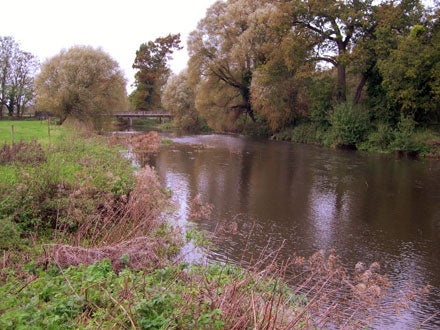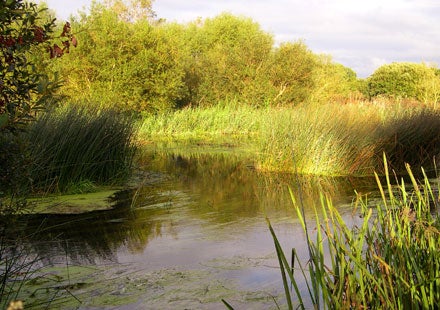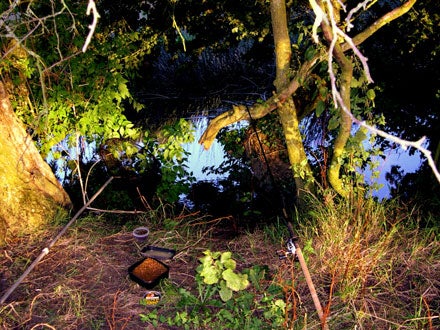| MARK WINTLE |
| Mark Wintle, an angler for thirty-five years, is on a quest to discover and bring to you the magic of fishing. Previously heavily involved with match fishing he now fishes for the sheer fun of it. With an open and enquiring mind, each week Mark will bring to you articles on fishing different rivers, different methods and what makes rivers, and occasionally stillwaters, tick. Add to this a mixed bag of articles on catching big fish; tackle design, angling politics and a few surprises. Are you stuck in a rut fishing the same swim every week? Do you dare to try something different and see a whole new world of angling open up? Yes? Then read Mark Wintle’s regular column. |
| GOING WITH THE FLOW Though most anglers fish only lakes these days, many others still prefer rivers. Yet why are rivers so fascinating? They’re certainly trickier to fish than lakes though that’s not always the case, but there is something very special about them. In my own case, practically all of my early fishing was on rivers. The majority of lakes that I now fish didn’t even exist thirty years ago and some didn’t exist five years ago. Once the habit is there, and moving water holds few fears for me, the continuous challenge of trying to catch fish in an ever changing environment has no equal. Lakes can be affected by drought and flood, by heatwave and storms, but in essence, they are far more predictable than the fickle rivers.
Though weirs and locks may impede movement, mostly the fish can roam where they want on our rivers so that you can’t ever be sure exactly what might be in your swim. Take one favourite swim on the Dorset Frome. By Thames standards, this river has a limited variety of species, no chub, barbel, ruffe, bleak, zander, bream, or tench. Yet that melting pot of a pool on the tidal reaches has produced for me, roach, dace, gudgeon, carp, perch, grayling, pike, minnows, rainbow, sea and brown trout, salmon, bullheads, eels, flounder, bass, rudd, shad, mullet, and once, for a bemused seeker of big roach (alas, not me), a tremendous grass carp. Indeed, when you think about it, the dedicated fisher of ‘commercial’ carp waters can suffer a bland mixture of fish; the ubiquitous small carp, tench, bream, possibly roach, rudd and perch, and those modern abominations the ‘F1’ carp. It’s a shame the silly sods that call it that name don’t even understand what it means, or what implications deliberately stocking these horrors might have. But see how few of my river list are likely to show. I’d hardly call myself a Thames regular these days but years ago when I did manage two or three weeks fishing at Oxford every year I had all sorts. The usual chub, roach, perch and dace, the small fry of bleak, gudgeon and ruffe, bream and silver bream sometimes, and when I tried the backwaters, carp and rudd. On its tributaries I have added to that mix; barbel from the Windrush, and the other week a first trip on the Kennet, produced grayling, trout, bream, a clonking great perch of 2.8 and an ide of 3lbs along with the expected dace and roach. But I digress. It is that unknown quantity, that element of surprise with a river that makes it a delightful place to fish. You’ve escaped from the artificial boundaries of a lake where the stocking density is known and even the size of fish predetermined. The worst cases are where the lake has only just been dug and filled with water. One such place was described in Anglers Mail recently, where an angler pulled out a succession of these stockies at just 6oz each, like peas in a pod. It was totally predictable. I fished one lake where even the bottom contours were so precise that it didn’t matter which swim you fished. Each and every one of them was identical. Contrast this with a river. Who knows what is lurking in some dark forgotten corner?
What’s more, the mixture of fish and dependence on natural conditions mean that the stock of the river is dynamic. Over the years different species thrive and decline. As one species declines, another is able to exploit the gap. There may be periods when a species is able to achieve specimen size, yet in less favourable conditions it fares much less well. Take the Dorset Stour over the last thirty years. Perch did well until the mid seventies then were hit badly by perch disease. It took a decade just to re-establish perch populations in its former strongholds, and nearer 25 years for there to be perch present again over the whole length of the river. Conversely, dace did well at the expense of roach until the mid eighties but since then dace have declined alarmingly in many stretches, mostly due to cormorant predation (though making a comeback at the moment). Roach did well until the end of the eighties, with good numbers of big roach in many areas, perhaps a legacy of good spawning years in the mid seventies. Since then, there has been a slow increase in numbers of small roach but big ones remain scarce. The great thing about the river is that it is impossible to predict what will happen next; will the big chub population grow old and collapse? Will the big roach return? Have we yet to see the best of the big perch? The flow brings the river to life. It takes more skill to control a float on a river, and yet that flow can be instrumental in catching fish. It will enable you to search the swim, to attract fish into your swim with judicious groundbaiting even over substantial distances, even encourage the fish to feed more to replace the energy used in fighting the flow.
Thinking about it, perhaps we make too much of how difficult it is to trot a float. I started trotting when I was 12, using a 5ft solid glass rod. As long as it wasn’t windy I managed well enough to catch fish albeit little ‘uns. I was self taught so it can’t have been that difficult. It is a simple skill that can be learnt in three or four sessions, certainly well enough to catch some fish. It helps if you’ve got someone to guide you but it shouldn’t be made out to be some mystical art that takes decades to get to grips with. Give it a try! That’s enough of the technicalities. It’s the variety of swims that captures my imagination; true, there are rivers that remain largely artificial due to the canalisation programs of the past, the featureless fenland rivers. But give a river a chance to go a little wild, and the permutations are endless. Shallows, deeps, pools and runs, back eddies and glides. Features like lily beds and reeds, overhanging trees and weed. Even a river like the Thames shakes off the shackles here and there with quiet weedy backwaters and foaming weirs. Then there’s the sheer size of rivers. Even a small river can be several miles long. Major ones easily exceed a hundred miles of water, even in this small island of ours. Add in tributaries and you often have scores of miles of bank to try, a far cry from some half-acre pond. Take my local Dorset Stour, a middling river, there is in excess of seventy miles of fishable bank, including a couple of tributaries, and I reckon that I’ve got access to at least thirty miles of that total. No wonder I sometimes feel that I am spoilt for choice. With so much water to choose from (I haven’t even mentioned the Avon) I have little difficulty in getting away from the crowds. It is true that in summer much of it is too weedy to fish at all, and that I must be prepared to walk a fair distance to get to much of it but that’s no great hardship if I travel light. With the summer weed gone, much more of the river is becoming fishable, and the best of the river fishing is yet to come. For me variety is the spice of fishing, and I like to fish rivers, great and small, as well as ponds, lakes, canals, drains, and even harbours. If you find yourself always fishing a single type of water then perhaps it’s time for a change, and if you’ve never fished or rarely fish a river, then why not give it a fair trial? Next: ‘A Question of Geography’ – Not all the big tench are down south Bob! |
















